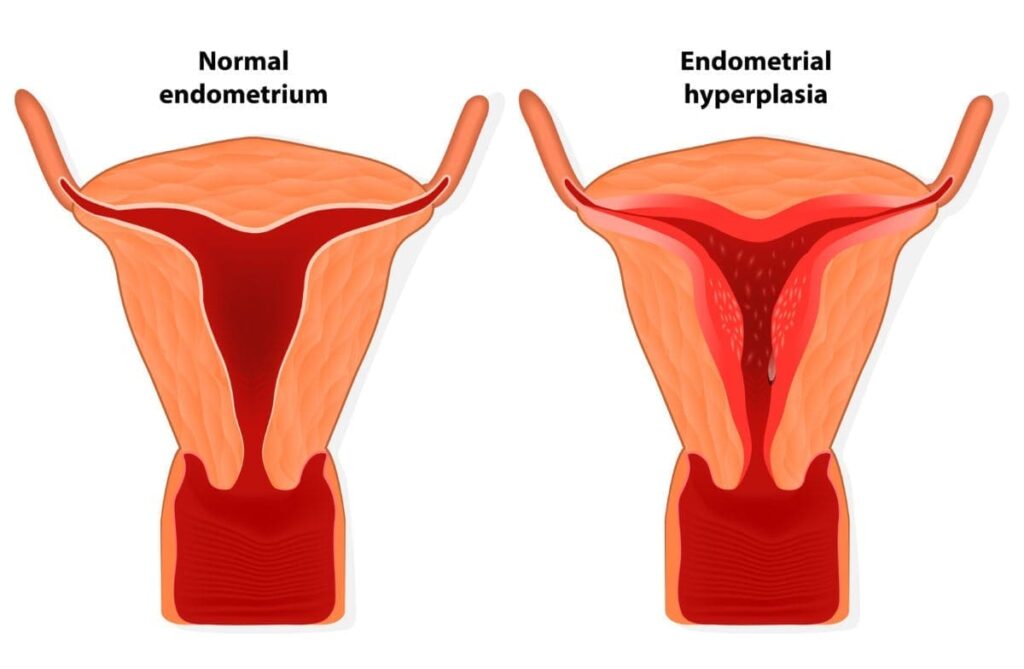Endometrial Thickening: Causes, Symptoms, Treatment, and Prevention
Endometrial Thickening or Endometrial hyperplasia is a condition when the lining of the uterus (endometrium), becomes too thick. The uterus is where a baby grows during pregnancy. Inside the uterus, there's a lining called the endometrium. This lining thickens each month in preparation for a possible pregnancy. If pregnancy doesn't occur, this lining sheds, causing menstrual bleeding. This condition is not cancer, but it can sometimes lead to uterine cancer, if not treated.
What causes endometrial thickening?
Endometrial thickening happens when the lining inside the uterus becomes unusually thick. This thickening occurs because there's an imbalance of hormones, mainly estrogen and progesterone, which regulate the growth of the endometrial lining. This can be caused by several factors:
1. Hormonal Imbalance: Fluctuations in hormones, especially estrogen and progesterone, can lead to excessive growth of the endometrial lining.
2. Obesity: Being overweight can increase estrogen levels, which in turn can cause the endometrial lining to thicken.
3. Polycystic Ovary Syndrome (PCOS): PCOS can cause hormonal imbalances that contribute to endometrial hyperplasia.
4. Menopause: Changes in hormone levels during menopause can also lead to thickening of the endometrial lining.
What are signs and symptoms of endometrial hyperplasia?
- Heavy or irregular periods
- Bleeding after menopause
- Pain or pressure in the pelvis
- Discomfort during sex
It's important to see a doctor if you experience any of these symptoms.
What risk factors are associated with endometrial thickening?
This is more common among individuals in perimenopause or menopause, It rarely occurs in people younger than 35. Additional risk factors include:
- Women over 35 are at higher risk.
- Excess body weight can contribute to hormonal imbalances.
- A history of certain conditions, such as diabetes mellitus, polycystic ovary syndrome (PCOS), gallbladder disease, or thyroid disease.
- Having never been pregnant
- Beginning menstruation at an early age and experiencing menopause at an older age.
- Prolonged use of estrogen without progesterone can lead to thickening of the endometrial lining.
- Family history of ovarian, colon or uterine cancer.
What treatments are available for endometrial thickening?
Treatment for this depends on its severity and underlying cause:
- Medication: Hormonal medications such as progestin may be prescribed to balance hormone levels and reduce thickening.
- Surgery: In some cases, a procedure called dilation and curettage (D&C) may be performed to remove excess endometrial tissue.
- Lifestyle Changes: Maintaining a healthy weight through diet and exercise can help regulate hormone levels.
What can I do to help prevent endometrial thickening?
While not all cases of endometrial hyperplasia can be prevented, certain steps can help reduce the risk:
- Maintain a Healthy Weight: By staying within a healthy weight range, you can help regulate hormone levels.
- Regular Exercise: Physical activity can help manage weight and reduce estrogen levels.
- Healthy Diet: A diet rich in fruits, vegetables, and whole grains can contribute to overall hormonal balance.
- Regular Check-ups: Routine gynecological exams can help detect any changes early on.
In conclusion, understanding the symptoms, causes, and treatment options for endometrial thickening is crucial for women's health. By being aware of the risk factors and taking preventive measures, women can actively manage their reproductive health and seek timely medical attention if symptoms arise.

